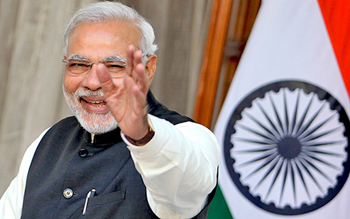New Delhi, May 26: Completing one year in office, Prime Minister Narendra Modi today enlisted the work done by his government, ranging from rejuvenating the economy to initiatives for the poor, and said this is just the beginning in the endeavour to transform the quality of life of people.
 In an open letter to the people, he said, "we have been able to restore trust in the government", ensure a "corruption-free" rule and made state governments equal partners in the quest for national development, building the spirit of Team India.
In an open letter to the people, he said, "we have been able to restore trust in the government", ensure a "corruption-free" rule and made state governments equal partners in the quest for national development, building the spirit of Team India.
Modi said he had devoted every element of his "body and spirit" in fulfilling with fullest sincerity and honesty the responsibility and honour entrusted by people a year ago in him of serving them as "pradhan sevak" (prime worker).
"We assumed office at a time when confidence in India story was waning. Unabated corruption and indecisiveness had paralysed the government. People had been left helpless against ever-climbing inflation and economic insecurity.
"Urgent and decisive action was needed," Modi said.
While presenting the report-card of one year in office, he said his government systematically went about addressing these challenges.
Runaway prices were immediately brought under control.
The languishing economy was rejuvenated, building on stable and policy-driven proactive governance, the Prime Minister said.
He said discretionary allotment of the country's precious natural resources to a chosen few was replaced with transparent auction and firm steps were taken against black money, from setting up an SIT and passing a stringent black money law, to generating international consensus against the same.
Uncompromising adherence to the principle of purity, in action as well as intent, ensured a corruption-free government, he said.
Significant changes have been brought about in the work culture, nurturing a combination of empathy as well as professionalism, systems as well as breaking of silos, Modi said.
Modi said state governments have been made equal partners in the quest for national development, building the spirit of Team India.
Most importantly, "we have been able to restore trust in the government".
The Prime Minister also said that his government is dedicated to the poor, marginalised and those left behind as it is guided by the principle of Antyodaya .
"We are working towards empowering them to become our soldiers in the war against poverty," he said.
Modi said numerous measures and schemes have been initiated from making school toilets to setting up IITs, IIMs and AIIMS, from providing vaccination cover to children to initiating a people-driven Swacch Bharat mission, from ensuring a minimum pension to labourers to providing social security to the common man, from enhancing support to farmers hit by natural calamities to defending their interests at WTO.
He also mentioned other initiatives like empowering one and all with the rule on self-attestation to delivering subsidies directly to people's banks, from universalising the banking system to funding the unfunded small businesses, from irrigating fields to rejuvenating "Ma Ganga".
Modi listed efforts towards 24x7 power, connecting the nation through road and rail, building homes for the homeless, setting up smart cities, connecting the North East and prioritising development of eastern India.
"Friends, this is just the beginning.
"Our objective is to transform quality of life, infrastructure and services. Together we shall build the India of your dreams and that of our freedom fighters.
"In this, I seek your blessings and continued support," he concluded.





Comments
Add new comment